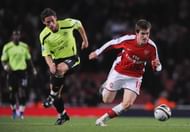
The EFL Cup, or Carabao Cup, as it is known due to sponsorship reasons, returned this week for the fourth round. Notably, three of these clashes are between Premier League clubs, that will be played over these 2 days in the Carabao Cup.
The Championship clubs who are left in the competition are all in good form, barring Middlesbrough, who are on a bit of a slowdown after drawing a few games.
This means that all teams involved in the competition have a difficult assignment to survive in the competition in addition to Premier League/Championship and Europe. The Carabao Cup has often been criticised for being an excessive indulgence by the Football League and a distraction to the bigger clubs.
The criticism, though, has not distracted the EFL or sponsors who continue to fund the tournament from different corners of the globe.
The last three sponsors of the EFL Cup or 'mickey-mouse cup' as it is nicknamed by some fans, include Capital One - a USA based Commercial bank, Moors Coors Brewery who sponsored it as the 'Carling Cup' and now Carabao, a Thai energy drink.
The competition has been mocked for the many advertisement opportunities it provides sponsors with. Fiascos over the Carabao's cup draw, earlier this season, were highlights of the 'much-ado about nothing' attitude that is carried.
However, away from all the controversy and disinterest showed by bigger clubs, who often field weakened teams, the EFL Cup is a very good competition for English football.
Here are 5 reasons that tell us how and why the cup is not a bad idea at all:
#5 Chance to win silverware and glory

The first part of this countdown is as simple and straightforward as they come - success. Whether managers like to admit it or not, most of them end up taking cup success very seriously. It is, after all, very rare to have footballers and coaches only in it for the money or so we think anyway.
Fans love cup success. Often, a rival club's fans poke fun at supporters for celebrating with a League Cup win, but they would almost certainly swap positions if it means their club gets to take a cup.
Last season for instance, Liverpool fans dismissed Manchester United's achievements of winning the EFL Cup and Europa League double, but were themselves horrified after their side lost to Southampton in the EFL Cup semi-final and would have bitten their hands off to have seen the Reds do a similar double.
The EFL Cup presents an opportunity for the success-starved sides in the league to push up and get a share of the glory by winning a major domestic trophy. Some smaller clubs that have won the cup in recent years and enjoyed their success include Swansea City and Birmingham City.
Though the big 5-6 clubs field their bench strength, it seems to be enough for them to rake in some more trophies and save otherwise disappointing seasons - case in point Jose Mourinho and Manchester United.
#4 Opportunity to exercise bench-strength and rotate squads

The Premier League is the bread and butter of the managers and players. Often, the pressure to succeed is consistently high throughout the season. This prevents managers from actually using the depths of their squad in the league, sticking to their best eleven in an effort to maximise the best possible results.
The EFL Cup, which has been much maligned, has long been the arena where younger players and the rotation players get a chance to show their skills. This almost always includes the second and maybe third choice keepers in some of the early rounds to play.
That is a huge shot in the arm for players who are stuck on the bench or in the stands for most of the season.
Arsene Wenger is known to prioritise giving younger players a go in the EFL Cup. Some notable players who made their way into the first team after impressing in the EFL Cup include Jack Wilshere, Kieran Gibbs, Cesc Fabregas and Theo Walcott.
Even though most squads are adequately filled, and most clubs do not rely on their youth to fill up the ranks in the EFL Cup, it is still an exciting opportunity for those not in the spotlight to grab the headlines.
The latest example being Edward Nketiah who scored an injury-time winner for Arsenal against Norwich in the fourth round, which is sure to make him a lot more popular.
#3 Freedom to experiment with tactics

We have already examined the pressures of modern football. Managers can scarcely afford to put even a toe out of line, lest they make a mistake. Innovation is often hailed in the world of sport, but it takes a brave man to put his neck on the line and do something new.
The EFL Cup, however, eases this pressure. Boards and fans accept failure in the EFL Cup and move on surprisingly quickly, unless the defeats are results of shocking performances or accentuate struggles in the league.
Managers often try out newer strategies that have not yet fully matured in the EFL Cup to gain a better understanding of the changes required. The competitive background of the Cup is perfect to allow tactics to develop in match situations.
The managers are sometimes forced into tactical changes with injuries and fatigued players influencing their choice. For instance, Arsenal in 2012, played a 4-2-4 after going 4 down at Reading to win 7-5 in extra time.
Roberto Martinez, in his last season at Everton, played 3 strikers and one midfielder as they chased a game at Norwich City. These innovations provide for exciting football where teams go gung-ho and try to make most of a difficult situation.
Similarly, just last night, Jose Mourinho employed a 3-4-1-2 formation against Swansea City. This came as a pleasant surprise to most, as the Portuguese tactician has refused to use this formation in the league so f. As a result, Rashford and Martial have been forced to be rotated. However, yesterday, both of them were played simultaneously as United's 2 strikers.
With most managers opting not to experiment in the league, this tournament provides the perfect platform for managers to dabble about with their squads.
#2 Chance to improve form

The EFL Cup is a welcome distraction for teams that are struggling to put together a run of form in the league. It helps in banishing the demons of the league and regaining some vital confidence in an environment where consequences are not massive.
It is also a great help for teams that are playing well to improve upon their performances and ride the confidence gained from progressing in cup competitions. The EFL Cup has often seen shock results, and they reverse the tide for many sides who gain a lot of motivation from doing well against bigger sides in the cup tournament.
Managers might view this cup as a distraction, but a much-needed win often comes in this cup, accompanied by relief and some joy for supporters. The flip side, is that a poor performance can threaten to even derail the season for a little while.
The most recent example was Everton last season. Losing to Norwich began a torrid run of form that included a loss at home to Watford, and was only ended in December by an Ashley Williams inspired last-minute victory over Arsenal.
So the EFL Cup does make a difference to the season and is therefore completely worth paying attention to as a fan and a club.
#1 Alternate route to Europe

Most clubs in the league would consider getting the chance to play in European competition a huge lift to their supporters and the club's image worldwide. European competition provides an amazing opportunity, attracting players that were otherwise inaccessible to them.
Birmingham City could actually take part in the Europa League Qualifying round despite relegation. While they failed to enter the group stage, other clubs could benefit from the European adventure more substantially.
Entering the group stages of Europe guarantees revenue increases from broadcasters, international exposure and an unforgettable experience for the fans.
The winner of the EFL Cup might have to begin the season early, but it is still a chance to earn European qualification in just 16 games spread over a year - 10 games in the EFL Cup and 6 games of qualifying. So much lesser than the consistency required to last a league campaign.
Winning the trophy also helps the club build up their bases for an ambitious launch pad for the future. It allows potential signings to be lured by clubs, making them an attractive option because of the success they have had by winning a trophy.
For instance, Swansea were able to consolidate their Premier League campaign thoroughly after their EFL Cup win. Despite struggling the next season. Micheal Laudrup was linked to many high-profile jobs because he had led a relatively small club to a major title.
So, an EFL Cup win certainly raises the profile of both club and manager.
